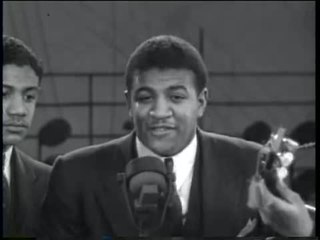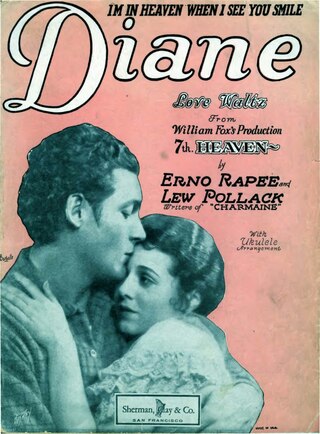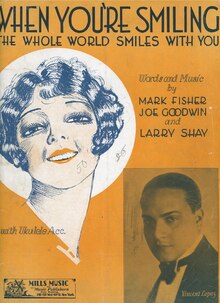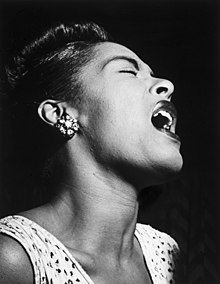"Mack the Knife" or "The Ballad of Mack the Knife" is a song composed by Kurt Weill with lyrics by Bertolt Brecht for their 1928 music drama The Threepenny Opera. The song tells of a knife-wielding criminal of the London underworld from the musical named Macheath, the "Mack the Knife" of the title.

Carmen Lombardo was lead saxophonist and featured vocalist for his brother Guy Lombardo's orchestra. He was also a successful composer. In 1927, Carmen Lombardo was the vocalist of the hit record Charmaine, performed by Guy Lombardo and His Royal Canadians.
"Do Nothing till You Hear from Me" is a song with music by Duke Ellington and lyrics by Bob Russell. It originated as a 1940 instrumental that was designed to highlight the playing of Ellington's lead trumpeter, Cootie Williams. Russell's words were added later. In 1944, Ellington's own recording of the song was a number one hit R&B chart for eight non-consecutive weeks and number six on the pop chart.

"Who's Sorry Now?" is a popular song with music written by Ted Snyder and lyrics by Bert Kalmar and Harry Ruby. It was published in 1923 as a waltz. Isham Jones had a hit recording in 1923 with the song arranged as a foxtrot. Later sheet music arrangements, such as the 1946 publication that was a tie-in to the film A Night in Casablanca, were published in 2
2 time. Other popular versions in 1923 were by Marion Harris, Original Memphis Five, Lewis James, and Irving Kaufman.
Shine is a popular song with lyrics by Cecil Mack and Tin Pan Alley songwriter Lew Brown and music by Ford Dabney. It was published in 1910 by the Gotham-Attucks Music Publishing Company and used by Aida Overton Walker in His Honor the Barber, an African-American road show. According to Perry Bradford, himself a songster and publisher, the song was written about an actual man named Shine who was with George Walker when they were badly beaten during the New York City race riot of 1900.
"Pennies from Heaven" is a 1936 American popular song with music by Arthur Johnston and lyrics by Johnny Burke. It was introduced by Bing Crosby with Georgie Stoll and his Orchestra in the 1936 film of the same name.
"You're the Cream in My Coffee" is a popular song published in 1928. Hit recordings were by Annette Hanshaw, Ben Selvin, Ted Weems and Ruth Etting.

"The Sheik of Araby" is a song that was written in 1921 by Harry B. Smith and Francis Wheeler, with music by Ted Snyder. It was composed in response to the popularity of the Rudolph Valentino feature film The Sheik.

"I'm Sitting on Top of the World" is a popular song with music written by Ray Henderson and lyrics by Sam M. Lewis and Joe Young. It was published in 1925. This composition is not to be confused with, "Sitting on Top of the World" written by Walter Vinson and notably performed by Taj Mahal & Corey Harris.

"Dinah" is a popular song published in 1925 and introduced by Ethel Waters at the Plantation Club on Broadway. It was integrated into the show Kid Boots. The music was written by Harry Akst and the lyrics by Sam M. Lewis and Joe Young. Hit versions in 1926 were by Ethel Waters, The Revelers, Cliff Edwards, and Fletcher Henderson.

"Diane" is a song by Ernö Rapée and Lew Pollack, and was originally written as a theme song for the 1927 silent movie 7th Heaven. Its musical composition entered the public domain on January 1, 2023. The song title is sometimes mistakenly referred to as "My Diane" or confused with the Beach Boys song "My Diane", which is a different song.

"Nobody's Sweetheart", also known as "Nobody's Sweetheart Now" and "You're Nobody's Sweetheart Now", is a popular song, written in 1924, with music by Billy Meyers and Elmer Schoebel, and lyrics by Gus Kahn and Ernie Erdman. The song is a jazz and pop standard.

"If I Could Be with You (One Hour Tonight)" is a popular song, with music by James P. Johnson and lyrics by Henry Creamer. Published in 1926, the song was first recorded by Clarence Williams' Blue Five with vocalist Eva Taylor in 1927. It was popularized by the 1930 recording by McKinney's Cotton Pickers, who used it as their theme song and by Louis Armstrong's record for Okeh Records (catalogue No.41448), both of which featured in the charts of 1930. Armstrong's recording of "If I Could Be with You" is defined by his sparse vocal style and ornamental virtuosic trumpet-playing.
"Rockin' Chair is a 1929 popular song with lyrics and music composed by Hoagy Carmichael. Musically it is unconventional, as after the B section when most popular songs return to A, this song has an A-B-C-A1 structure. Carmichael recorded the song in 1929, 1930, and 1956. Mildred Bailey made it famous by using it as her theme song. Like other 1920s standards, "Rockin' Chair" relied on the stereotypes of minstrelsy, citing "Aunt Harriet" from the anti-Uncle Tom song "Aunt Harriet Becha Stowe" (1853).

"Way Down Yonder in New Orleans" is a popular song with music by John Turner Layton Jr. and lyrics by Henry Creamer. First published in 1922, it was advertised by Creamer and Layton as "A Southern Song, without A Mammy, A Mule, Or A Moon", a dig at some of the Tin Pan Alley clichés of the era.
"Between the Devil and the Deep Blue Sea" is an American popular song published in 1931, with music by Harold Arlen and lyrics by Ted Koehler, and first recorded by Cab Calloway in 1931. It was introduced in the 1931 Cotton Club show Rhythmania and is now a widely recorded standard.

"Swingin' Down the Lane" is a 1923 song composed by Isham Jones with lyrics by Gus Kahn. Jones' instrumental version was second to "March of the Wooden Soldiers" in the list of top songs for 1923. Other popular versions in 1923 were by Ben Bernie, and The Columbians.

Days of Wine and Roses and Other TV Requests is the eleventh studio album by American pop singer Andy Williams and was released in April 1963 by Columbia Records following his first season as host of his variety series, The Andy Williams Show. The LP has a studio recording of the closing theme from the show, "May Each Day", and continues the format of his previous Columbia releases by including songs from the 1920s, 1930s, 1940s, and 1950s.
"Dippermouth Blues" is a song first recorded by King Oliver's Creole Jazz Band for Gennett Records in April 1923 and for Okeh Records in June of that same year. It is most often attributed to Joe "King" Oliver, though some have argued that Louis Armstrong was in fact the composer. This is partly because "Dippermouth", in the song's title, was a nickname of Armstrong's. Also, the phonograph recordings from 1922 gave credit to Armstrong and Oliver jointly. The song is a strong example of the influence of the blues on early jazz. There is a twelve-bar blues harmonic progression, with frequent bent notes and slides into notes.

Under the Copyright Term Extension Act, books published in 1928, films released in 1928, and other works published in 1928, enter the public domain in 2024. Sound recordings that were published in 1923 enter the public domain.













